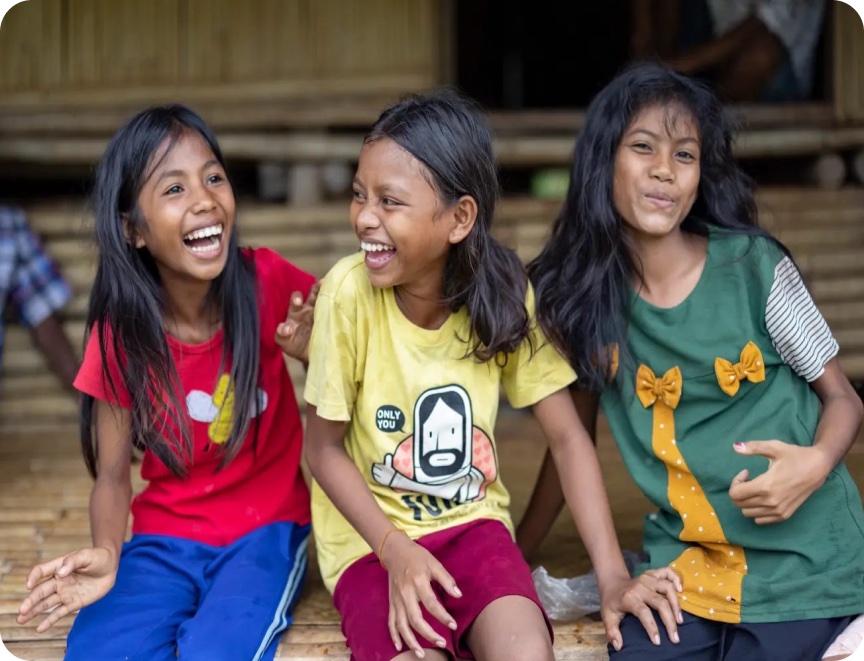It is striking to consider the transformation that has occurred for a number of countries in our region over the past 20 years. Countries like Vietnam, Indonesia and the Philippines have graduated to the rank of lower middle income economies and recorded substantial progress in human development. For many children and families, this has meant better access to education and healthcare, fewer child deaths and improved standards of living.
In Vietnam, almost 60 per cent of the country was living below the poverty line just two decades ago. This has now fallen to less than 20 per cent. Child mortality has halved. Nearly all children now get at least a primary education. Public health services have vastly improved.
On my first trip to Vietnam with ChildFund Australia in 2006, I travelled to Hoa Binh province in the rural north to visit some of our partner communities. When we talked with local people, particularly women, it was obvious there were many, very serious problems. Malnutrition was very high, malaria was still an issue in many places, health care was often unavailable, literacy levels were low and household incomes vastly inadequate. Families were living a precarious, subsistence existence. It was beyond what I had seen during my years as a social worker in Australia.
It was very interesting to return to one of these areas, late last year, where ChildFund has now been working for more than a decade. The contrast to my first visit was stark. In this community, the improved situation and opportunities for children were clearly visible: a high-quality early childhood centre, a good primary school with well-trained, motivated teachers using modern teaching methods, families producing at least two rice crops a year because of improved irrigation and farming practices, children looking healthy and well nourished, and micro businesses flourishing. The data confirmed that household incomes had gone up markedly and families were investing in better housing, new enterprises and further education for their children.
There is absolutely no question that aid projects, run in partnership with local communities, have been a big part of that improvement. Most of the changes have come due to the efforts of local people determined to create a better future for themselves and their children. I have always been struck by how motivated the children and families in our partner communities are, how appreciative they are for these small opportunities and how successful they are at turning them into big changes. It’s that notion that if you give people a break, more often than not, they’ll take it.
Of course, aid is not the only factor. Growing economic activity across the region has been crucial and the Government of Vietnam has made tremendous progress in many ways. Roads into remote communities make a massive difference, bridges across rivers make a huge difference, district hospitals, access to markets, incentives for economic activity and job creation all contribute. However, these macro changes don’t always translate into services and opportunities for the most vulnerable children and their families. This is where aid projects play such an important role.
If we are to finish the job of ending poverty, aid is vital, particularly for children who don’t always benefit immediately or directly from general economic growth. Aid projects ensure that opportunities reach children too. These relatively small investments, whether it’s early childhood development programs or improved agricultural practices, go a long way in resource-poor communities.
We should be proud of the vital role Australians have played in helping millions of children survive and thrive, not only in Vietnam but throughout our region. But we have to finish the job. I am more determined than ever to continue what has been a significant global effort for the past 20 years to end extreme poverty and ensure every child can realise their right to survive, to have basic opportunities, to live a decent life.
On my latest visit to Vietnam, I saw communities that still need help. Villages that haven’t yet been reached with support, where the children were hungry, illiterate and without basic health care. It is simply not acceptable to stand by and watch our neighbours’ children suffer when it is well within our means to prevent it.
We know a small investment will make a huge difference for these children. We know this can happen quite quickly if we keep up the momentum of the last 20 years. It is within our power to help, so let’s finish the job.
ChildFund Australia is proudly part of the Campaign for Australian Aid, a joint initiative of the Make Poverty History and Micah Challenge coalitions, for all Australians who believe we can and should do more as a nation to end extreme poverty around the world.
Follow Nigel on Twitter.
Read more from Nigel here.




























